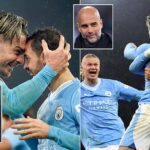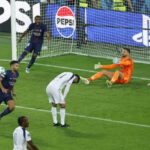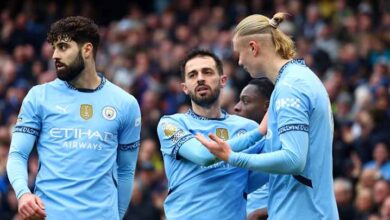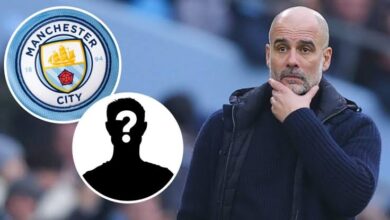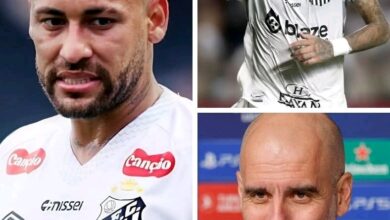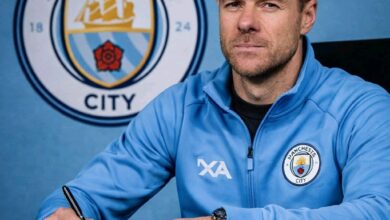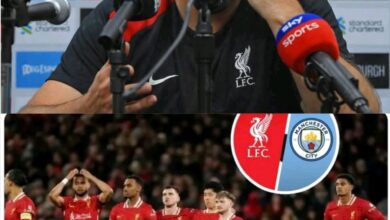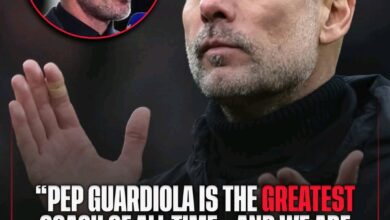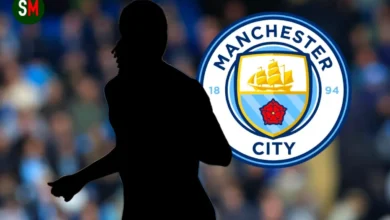Man City’s U21s fared better than Man United’s seniors…
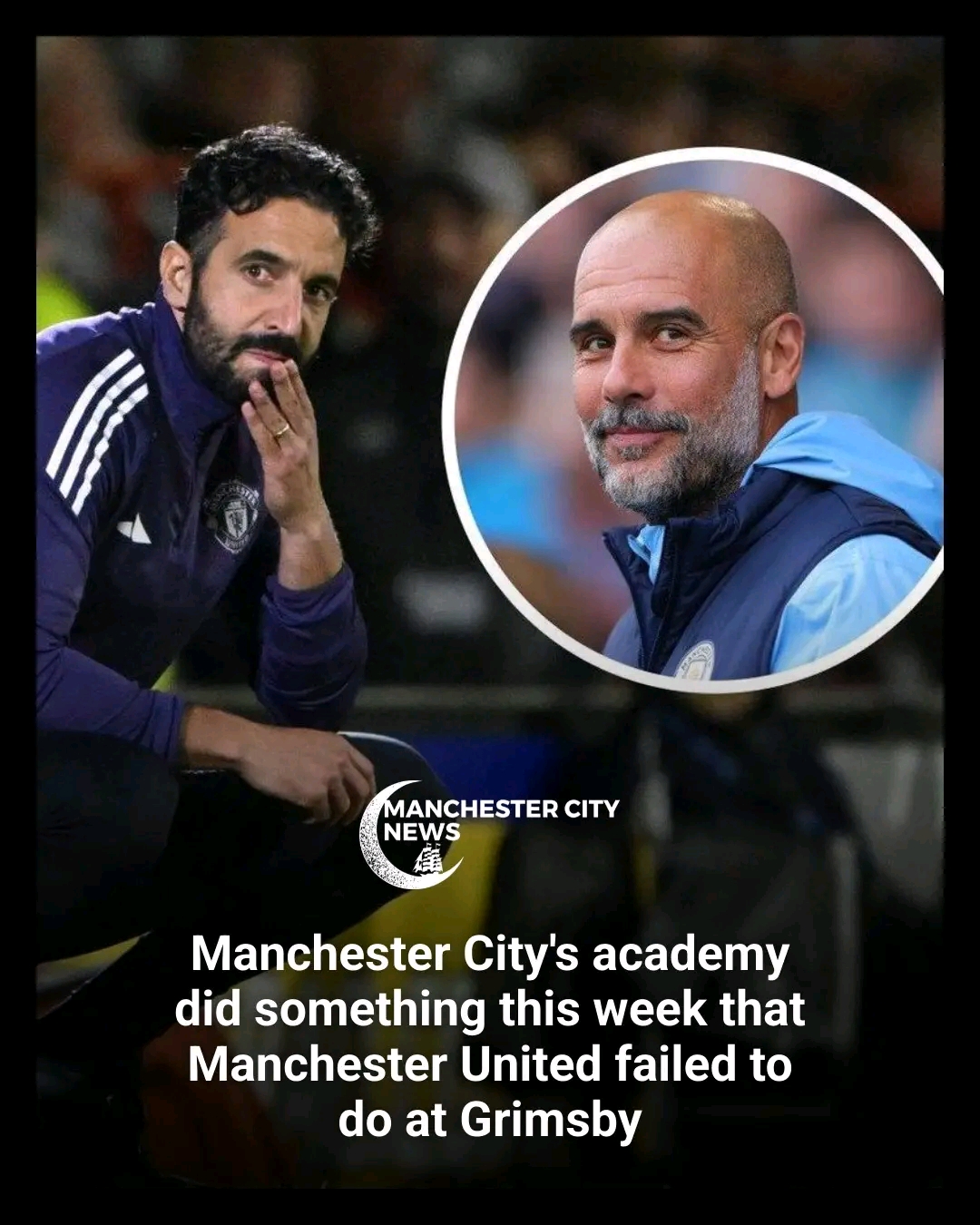
Manchester United fans could hardly believe what they witnessed at Blundell Park on Wednesday night. A club that once dominated English and European football, a club that prides itself on never being beaten by so-called “smaller” opposition, suffered humiliation at the hands of League Two side Grimsby Town in the Carabao Cup. And if that wasn’t bad enough for the red half of Manchester, across town their biggest rivals, Manchester City, had just shown only 24 hours earlier that even their academy team knew how to get the job done against a side from the same division.
For Manchester City supporters, it was a night of laughter, mocking chants, and endless banter aimed at their neighbours. For United fans, it was another painful reminder that the glory days of Sir Alex Ferguson are gone, and the club is still searching for its identity under Ruben Amorim. The Carabao Cup might not be the most prestigious trophy in England, but for fans it is about pride, tradition, and avoiding embarrassment. On this occasion, embarrassment was exactly what Manchester United delivered.
The shock started early at Blundell Park when Charles Vernam and Tyrell Warren fired Grimsby Town into a two-goal lead within half an hour. United looked disjointed, confused, and nervous. Amorim’s tactics appeared shaky, and the defence looked like strangers. Even though Harry Maguire, who has been mocked many times in the past, stepped up to score and drag his team back into the game, United could not find a way past Grimsby’s heroic resistance. The match ended in a draw, and the dreaded penalty shootout came. Once again, the underdog rose to the occasion, with Grimsby winning the shootout and sending United crashing out of the competition.
That result, as bad as it was, became even worse when you compared it to what Manchester City’s Under-21s had done the previous evening. Ben Wilkinson’s young City side traveled to Boundary Park to face Oldham Athletic in the EFL Trophy, a competition where academy sides face professional League One and League Two teams. Oldham, like Grimsby, play in League Two, but unlike United, City’s kids made light work of them.
Mahamadou Sangare opened the scoring in the 38th minute, showing composure and class beyond his years. Just minutes later, Justin Oboavwoduo doubled the lead with a confident finish, and then Ashton Muir added a third on the stroke of half-time. The young Blues were ruthless, clinical, and fearless, qualities that United’s senior squad failed to show against Grimsby. Even when Oldham pulled one back through Luke Hannant’s penalty, City’s youngsters refused to be shaken. Sangare scored again, and Muir added another to complete a stunning 5-1 victory.
That performance wasn’t just a footballing masterclass; it was a statement. Manchester City’s academy, carefully built and invested in for years, is producing a steady stream of talent ready to step into Pep Guardiola’s first team when needed. Their ability to outplay, outscore, and outthink experienced professionals in League Two shows just how advanced their development system is. For United, meanwhile, the loss to Grimsby symbolized how far behind they have fallen, not just at the senior level but across the whole structure of the club.
City fans wasted no time in mocking their rivals. Social media was flooded with clips of City’s goals against Oldham alongside memes of United missing penalties against Grimsby. “Even our kids know how to handle League Two sides,” one fan tweeted, while another joked, “If United need tips, maybe they can ask our Under-21s for a training session.” It was brutal, but it was also true.
The bigger picture here is not just one bad night in the cup. It is about direction, structure, and leadership. Manchester City have spent years building one of the most modern and effective academies in Europe. The City Football Academy is not just a building; it is a philosophy. Every age group plays in the same style as Pep Guardiola’s first team, ensuring that when a young player is called up, he already understands the system. That is why players like Phil Foden, Rico Lewis, and Oscar Bobb have been able to transition so smoothly.
Manchester United, on the other hand, once had the most famous youth system in England, producing legends like Ryan Giggs, Paul Scholes, David Beckham, and the Neville brothers. But in recent years, their academy has not had the same impact. While some talents like Alejandro Garnacho have emerged, the pathway is not as clear or consistent as it is at City. Wednesday night against Grimsby was not just a defeat; it was a symbol of a deeper problem.
Ruben Amorim, who was brought in with a reputation for being a tactical innovator and a builder of young squads, now faces serious questions. Losing to a League Two side is damaging, but losing in a way that makes your biggest rival’s academy look superior is devastating. United fans are growing restless. They want progress, they want hope, but what they saw at Blundell Park was chaos.
Meanwhile, Manchester City are preparing for their own Carabao Cup campaign, entering at the third-round stage due to their European commitments. Their draw sees them face Huddersfield Town, a League One side, and fans are already confident that Pep Guardiola’s men will handle it with ease. For City, the Carabao Cup has often been a competition to blood young players while still competing for trophies. For United, it was supposed to be a chance to lift some silverware and rebuild confidence. Instead, it ended in disaster.
There is also a psychological element here. When academy players see their club’s first team struggling, it can be discouraging. But at City, the opposite is happening. The academy sees the first team winning, they see Guardiola trusting young talent, and they know there is a pathway. That motivation pushes them to deliver big performances like the one at Oldham. At United, the message is less clear. Young players may wonder if they will ever truly get the same chances, especially when the senior squad itself looks lost.
Football is full of rivalries, but few are as bitter and intense as Manchester United versus Manchester City. Once upon a time, United fans would laugh at City for being the “noisy neighbours” who never won anything. But now, the tables have turned completely. City are the dominant force, both in England and in Europe, while United struggle for identity, direction, and pride. This week’s events only reinforced that shift. City’s kids were celebrating goals and victories; United’s stars were trudging off the pitch in shame after losing to Grimsby Town.
Looking back at the details of the two matches, the contrast is striking. City’s Under-21s played with freedom, confidence, and style. Sangare and Muir looked like stars in the making, while Oboavwoduo showed the sharpness of a seasoned striker. They passed the ball quickly, pressed high, and showed no fear of their older opponents. United, by contrast, looked flat, uninspired, and nervous. Maguire, ironically often criticised, was the only one who showed real fight. The rest of the squad looked as though they had no plan, no urgency, and no belief.
For City fans, the joy comes not only from their own success but from United’s pain. To them, this is another chapter in the story of their dominance. They see their academy thriving, their first team competing for trophies, and their manager building for the future. For United, the story is one of frustration, decline, and constant disappointment.
The upcomingweeks will be crucial for Ruben Amorim. He needs to rally his players, restore confidence, and show that the defeat at Grimsby was an accident, not a sign of deeper problems. But history suggests that these kinds of defeats leave scars. Fans will not forget easily, and rivals will not let them. Every time United step on the pitch, chants of “Grimsby, Grimsby” may echo around stadiums. Every time City’s academy scores another goal, the comparisons will be drawn again.
Manchester City’s academy has once again proven its strength, and Manchester United have once again highlighted their weakness. In football, small details matter. Winning against Oldham in the EFL Trophy may not seem like a huge event, but when it is set against United’s collapse at Grimsby, it becomes symbolic. It is not just about who won and who lost; it is about the direction of two great clubs. One is building for the future with a clear plan, the other is stumbling in the present with no clear path forward.
As things stand, the blue side of Manchester is smiling, the red side is hurting, and the rest of the football world is watching with fascination. Rivalries are built on moments like this, and this week’s events will not be forgotten anytime soon.
In the end, the difference could not be clearer. Manchester City’s Under-21s went to a League Two ground and came away with a 5-1 victory. Manchester United’s first team went to a League Two ground and came away humiliated, knocked out of the Carabao Cup. Two teams, two nights, two very different stories – and one city that knows which side currently holds the power.

